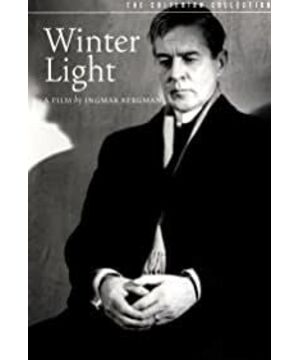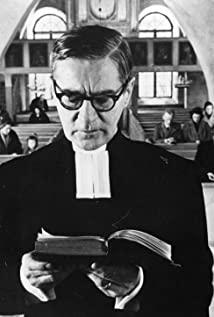Most of Bergman’s films are like a deadly silent and fringe world full of obscurity and depression, making people hard to reach and embarrassed, but the profound thoughts and unmatched wisdom embodied in them, People have to be obsessed and impressed by it. This unique atmosphere and appeal have also continued in the movie "Winter Light". Bergman is like a philosopher and thinker who sees through the world with a profound and unpredictable look. The heavy attitude tells his insights, doubts and understanding of the meaning of life and religious beliefs.
This film does not have much storytelling. It is more of a way of telling and talking about the deep connotation and theme of the film. Although it feels a bit dull and boring, it will be after careful taste and understanding. The discovery of these profound monologues and dialogues, on the contrary, provides us with more clues and space for thinking, which are worth remembering in our hearts. There are also some typical Bergman-style symbolic details and fragments in this movie.
For example, the clear close-ups of the characters at the beginning of the film seem to be able to detect their confusion, helplessness, sorrow, and loneliness in their cruel reality and beautiful beliefs from their specific facial expressions. Familiar clocks and candlelights also appear in the film, like the embodiment of the fragile side of life and faith in the rush of time, and also play a key role in deepening the theme. In the film Bergman also uses two children to show his disgust and indifference to religious beliefs, and expresses the uselessness and hopelessness of communication between people through the indifferent communication of the characters in the film.
There are three important characters in the film. In my opinion, they are more like Bergman's clones, with different identities and different perspectives to reflect his views and questions. The first one is a gloomy and pessimistic fisherman. After praying sincerely and accepting the baptism, the fisherman’s wife took him to find the pastor, hoping that he could enlighten him in the name of God and help him out of his spiritual dilemma, but after understanding, What makes him ridiculous is that the cause of his depression and fear turned out to be the fear and threat brought to him by the "increasing power" of China at that time. Later, the self-contradictory priest could not help him, and in a blink of an eye he embarked on a path of no return.
Seeing the fisherman’s destiny, one can’t help but sigh that even the God who many people (including himself) firmly believe in can bring infinite hope and stability to mankind failed to redeem him. On the contrary, this is incomprehensible and similar. The neurotic beliefs also made him even more immersed in the cruelty of life, so that a news that couldn't get together can touch his sensitive cells, making him trapped in a negative emotional atmosphere. What is more thought-provoking is the question he asked the pastor: Why do we continue to live? Even if you look at it now, it is still a human life question that can make people ask themselves but it is difficult to give definitive answers and ask for lifelong questions.
On the whole, the character in the center of the film is actually a priest. On the one hand, he impassionedly praised the beautiful meaning of God's existence, and God's sacrifice and sacrifice to mankind, and the extremely admirable and yearning happy life shaped by his belief in God. But when he took off this tool-like identity title, driven by the real facts around him, as well as the illusory beauty endowed by faith and the cruel reality endowed by reality, he began to shake, be confused and confused. Just as the pastor’s assistant explained to him his insights into the crucifixion of Jesus at the end of the film, as if it also expressed the pastor’s and Bergman’s aspirations. Illness and physical torture are nothing at all, but mental injuries are what they are. The deadliest blow.
"Give me the meaning of life, and I will be your obedient slave." This is what a middle-aged female teacher said in the film, and is also an important member of the three roles. She was crazy in love with the priest, and even willingly gave everything for him. In the film, the female teacher sends a letter to the pastor. Bergman converts the content of the letter into a monologue of the female teacher sitting in front of the camera. Her deep hesitant and introverted expression reveals a sad and sad atmosphere. She tells about religion. Faith was disgusted and puzzled, and told the pastor how much she loved him. The first sentence of this paragraph is a sentence in the female teacher's monologue. In fact, the pastor in the film is equivalent to the belief and the value of existence of the female teacher, but later when she learned in the classroom that the pastor was disgusted and disgusted with all of her , The hope and meaning he believed to be alive became clouds in an instant. In fact, the relationship between her and the pastor, between the pastor and his dead wife is a relationship between man and God.
The reason why the pastor hates her, apart from the many unconvincing reasons he said, the real reason is that the female teacher’s love and entanglement for him made him realize that his beliefs are slowly being disintegrated. In his eyes, God exists like his wife. He is afraid that his attachment to his wife will be replaced by a female teacher. He can no longer rely on this kind of spiritual sustenance to live a life. Only then will the cynicism with her gradually drift away, and she will be close to temptation in every possible way. Just wanting to experience the meaning of life in the pastor, that's why the two are involved in an extremely contradictory and tangled relationship. In fact, faith often exists only as an excuse and reason for escaping from reality, disguising one's pain and sorrow with a layer of armor that thinks it is invulnerable and illusory. Under the erosion of cruel reality, it acts as a kind of life-saving straw. Mental needs and psychological comfort. Whether it’s the fascination with people or the worship of God, most of them are just finding a meaning of survival and spiritual sustenance.
In my opinion, this movie is like Bergman’s inner monologue. The mouths of others express their own unique insights and insights into the meaning of life and religious beliefs, as well as thought-provoking doubts, and give the audience a more thorough understanding and introspection of life. Although Bergman’s films do not have the dazzling computer technology and technological content of modern movies, and the film elements and celebrities to entertain the public, they have profound philosophies and lofty thoughts that are rare in current movies. Give us more touches of extraordinary value. At the end of the film, there was no one in the church except for the female teacher, and the pastor continued to worship as usual. Can't help but make people feel suspicious, is he deceiving himself? Or is it the sorrow of the era?
View more about Winter Light reviews











